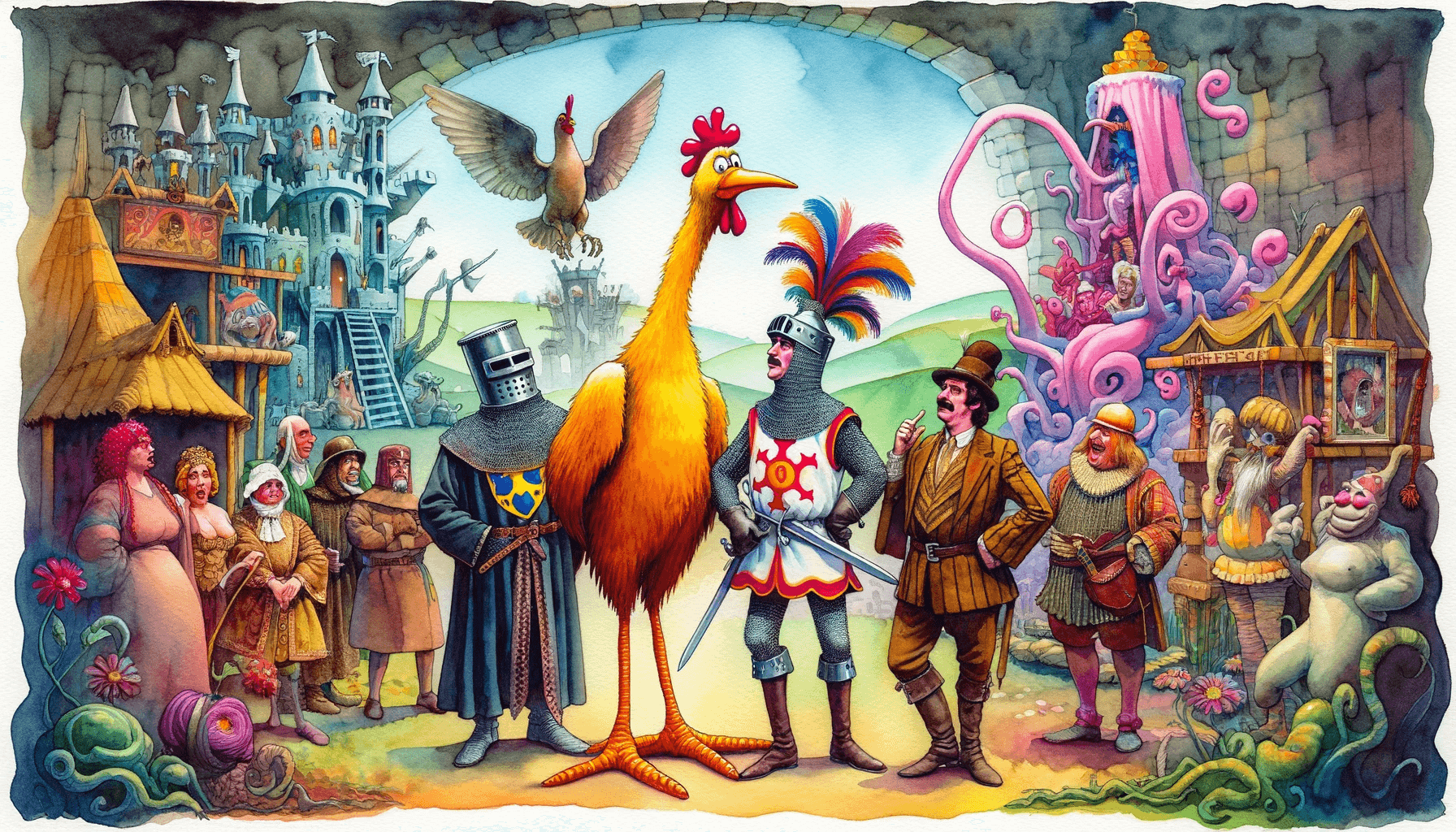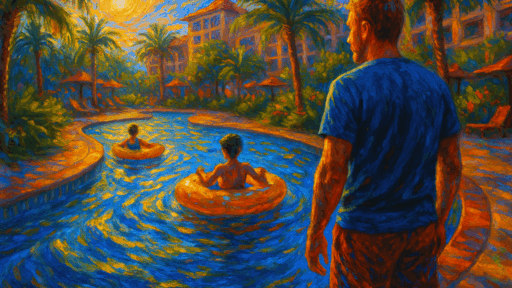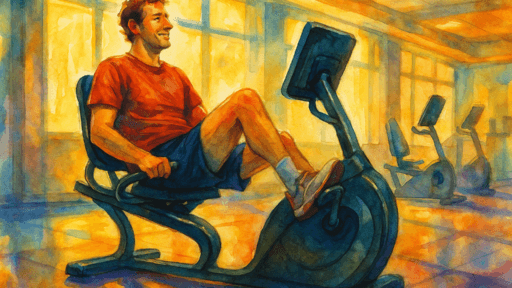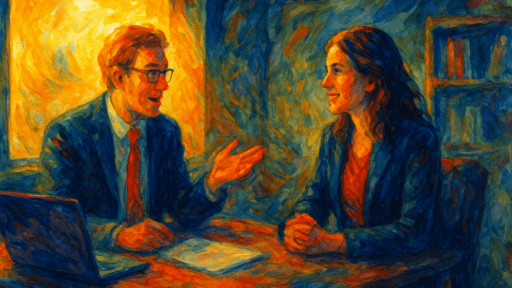“If you want to lift yourself up, lift up someone else.”
Booker T. Washington
If my life were a Monty Python sketch, it would be one where the absurd meets the profound in the form of mentorship. Picture a scene where, at every significant crossroad, a mentor appears with the timing and flair of a Python gag—unexpected, slightly bizarre, yet remarkably insightful.
These mentors have not only added a twist of humor to my life’s narrative, but have also imparted wisdom in the most unconventional ways. Their influence has turned my life’s script into a delightful blend of the unexpected and the enlightening, much like a Python sketch that leaves you both puzzled and profoundly entertained.
Mr. Pool
The first scene of this mentorship journey began in high school with Mr. Pool, my sophomore English teacher. He was a relatively young teacher, a sort of educational maverick in our small, Catholic school. With a flair for shaking things up, he was like a plot twist in flesh and blood—always ready with a personable smile, his signature fish ties, and an open door for his students. Mr. Pool had a knack for appreciating the finer points of student sarcasm, a trait in which I was unintentionally proficient.
His classroom was less about the rigid recitation of Shakespeare and more about finding the underdog’s hidden voice. He saw something in me—maybe it was my ability to craft a coherent sentence or perhaps my palpable dread at the mere thought of a future in math. In a move that was very much ‘Mr. Pool,’ he helped me land my first real job at the local newspaper.
This wasn’t just him going the extra mile—it was him running a marathon in the opposite direction of conventional teaching. The fact that he singled me out for this opportunity felt less like a stroke of luck and more like being handed a golden ticket in the Wonka factory of life’s opportunities.
This act of generosity from Mr. Pool was a lesson in the profound impact of giving. The experience at the newspaper was invaluable, sure, but witnessing firsthand how generosity shapes both the giver and the receiver? That was the real education. It was a lesson in the art of being human—a lesson that Mr. Pool, in his disruptively kind way, imparted without even trying.
Andy Dubois
Enter the world of journalism, a realm where my role was less of a cub reporter and more akin to a puppy amidst a pack of seasoned hounds. In this bustling newsroom, I met Andy Dubois. Amidst the clatter of keyboards and the hustle of breaking news, he could’ve easily brushed me off as ‘that high school kid making a nuisance of himself.’ But Andy, with a wisdom as deep as his inkwell, chose a different path.
He took me under his wing, not just in the art of writing, but in the subtler art of belonging. As a teenager in a world of adults, I had to prove my mettle—hitting deadlines, embracing the grunt work, and learning to laugh at myself. It was a trial by fire, but once I earned Andy’s trust, he became more than a mentor—he was my guardian in the newsroom jungle.
Andy showed me what it means to be the person who welcomes the new, the inexperienced, the outsiders. He taught me that the real gift in any workplace—any community—isn’t just in what you receive, but in what you give.
Working for Andy I learned that generosity wasn’t just a nice-to-have—it was the secret sauce. His legacy wasn’t just in the articles that bore his byline—it was in the warmth and camaraderie that he fostered, a lesson I would carry with me long after my days at the newspaper were over.
Rudy and Heather
Then there was Rudy Ruiz, the Yoda to my Luke Skywalker…if Yoda had led a band reminiscent of Yanni and then later ran an ad agency. Rudy, the older brother of my closest friend, inexplicably took an interest in my development.
I started as a glorified roadie for his band, a role I embraced with the enthusiasm of a golden retriever. But this wasn’t just lugging around speakers and coiling cables—it was a foray into the electric heart of live music.
I found myself climbing 20 feet up in the air, adjusting spotlights with the careful precision of a tightrope walker. Timing light changes to the music became my own high-wire act, each concert a dance of shadows and beams choreographed by my fingertips. I turned into an arm-chair electrician, wrestling with the quirks of ancient theaters where blowing a fuse was as likely as an encore.
Perched like a nervous bird above the stage, orchestrating a ballet of lights, I felt like the unsung hero of an electric, Yanni-esque rock opera. It was a mix of heart-pounding excitement and artistic flair, a teenage adventure set against a backdrop of music that was more about enchanting melodies than rock and roll rebellion.
This chapter led me to an internship at Rudy’s ad agency, a place that buzzed with a kind of creative energy that made even the most mundane tasks feel like part of a grand, artistic endeavor. It was like stepping into a world where even the act of refilling the printer paper could be a scene in an offbeat indie film.
Sure, there were moments that felt like an IKEA assembly challenge, where the instructions were more like riddles. But these tasks, each with their own quirky twist, were far from tedious. They were more like puzzles that, when solved, gave a disproportionate sense of triumph. Under the wing of Rudy and his wife Heather, I was learning the kind of lessons that no classroom dared to teach.
Their approach to mentorship was a blend of kindness and practical wisdom, served with a side of wry humor. They taught me the art of giving feedback on creative work, which was less about sugarcoating and more about striking that delicate balance between ‘brutally honest’ and ‘constructively kind.’ It was a skill as nuanced as a tightrope walk over a pool of hungry critics.
Every day with them was a mix of exhilaration and enlightenment, a reminder that in the world of deadlines and design briefs, there’s always an opportunity for a little laughter and a lot of learning. It was, in a way, a crash course in the art of living creatively, taught by two of the most unexpectedly brilliant professors life could have thrown my way.
Always Look on the Bright Side
Reflecting on my life’s mentorship journey, I’m reminded of that Monty Python mantra about always looking on the bright side of life. It’s as if each mentor, from Mr. Pool with his fish ties to Rudy and Heather with their whirlwind of creativity, has been part of a secret society dedicated to teaching me this art. They’ve turned my life into a series of lessons in optimism, each more absurdly valuable than the last.
This journey has been less about collecting wisdom and more about learning to dance in the rain, sometimes literally, when the newsroom roof leaked. These mentors have shown me that life’s not about avoiding the puddles but about splashing through them with a grin.
The truth is it has been decades since these mentors first impacted my life. As I’ve continued my journey, I’ve done so armed with an arsenal of optimism and a PhD in finding the funny. I’ve learned that the brightest side of life isn’t a distant, sunny spot; it’s right here, in the laughter shared over a misprinted headline or the triumph of fixing a fuse mid-concert.
It’s in these moments, these small victories of joy and shared chuckles, that I feel a profound sense of gratitude for every twist and turn, for every mentor who’s guided me, and for the wonderfully unpredictable journey that life has been.





